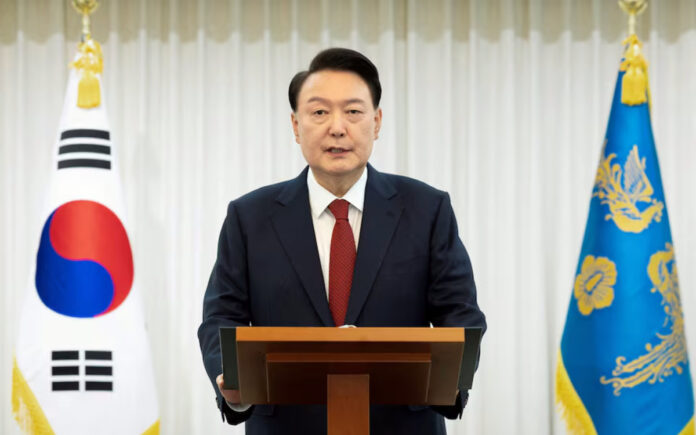Seoul: South Korean President Yoon Suk Yeol vowed to fight for his political future following his impeachment by the opposition-led parliament, marking the second attempt to oust him over his brief and controversial bid to impose martial law. The move has sent shockwaves through the nation.
The Constitutional Court will now decide Yoon’s fate, with a ruling expected within six months. If removed from office, a snap presidential election will be triggered. In the interim, Prime Minister Han Duck-soo, appointed by Yoon, assumes the role of acting president while Yoon’s presidential powers remain suspended halfway through his five-year term.
“I will give all my strength and efforts to stabilize the government,” Han stated after the vote. Later, he chaired a National Security Council meeting, emphasizing the importance of maintaining a “watertight readiness posture” against potential provocations from North Korea. The political turmoil, which has already led to the resignation or arrest of several senior defense and military officials, has raised concerns over South Korea’s ability to deter threats from a nuclear-armed North Korea at a time of expanding ties between Pyongyang and Russia.
Yoon becomes the second conservative president in South Korea’s history to face impeachment, following Park Geun-hye’s removal in 2017. Unlike the first impeachment attempt, which Yoon survived last weekend due to a parliamentary boycott by his party, this vote succeeded with significant support from his own People Power Party.
Political Fallout and Public Reaction
“Although I am stopping for now, the journey I have walked with the people over the past two and a half years toward the future must never come to a halt. I will never give up,” Yoon declared defiantly.
Once celebrated as a tough political survivor, Yoon now faces increasing isolation, grappling with personal scandals, internal party rifts, and fierce opposition. Protests erupted nationwide following the impeachment vote, with demonstrators celebrating outside parliament, waving LED sticks and chanting slogans. In stark contrast, a rally of Yoon supporters dissipated quickly after the announcement.
Opposition leader Lee Jae-myung, addressing jubilant crowds, urged for continued efforts to ensure Yoon’s removal. “You, the people, made it. You are writing a new history,” he told demonstrators braving freezing temperatures.
Martial Law Controversy
The impeachment motion garnered 204 votes in the 300-member National Assembly, surpassing the required two-thirds threshold. At least 12 members of Yoon’s party joined opposition lawmakers in the vote, reflecting fractures within the ruling coalition.
Yoon’s declaration of martial law on December 3, which granted sweeping emergency powers to the military, was rescinded just six hours later after parliament overwhelmingly rejected the decree. The brief order had been justified by Yoon as a means to address “anti-state forces” and political gridlock. However, critics labeled it unconstitutional, prompting widespread calls for his resignation and sparking a constitutional crisis.
Yoon later apologized for the move but maintained that it was necessary, vowing to “fight to the end” to defend his actions and resist opposition efforts to unseat him.
Also Read | Georgia’s Parliament Chooses Anti-Western Leader as New President
Broader Implications
Political analysts warn that Yoon’s impeachment will not resolve the underlying turmoil. “It is not even the beginning of the end,” said Leif-Eric Easley, a professor at Ewha University in Seoul.
Opposition leader Lee Jae-myung, seen as a frontrunner in any potential election to replace Yoon, faces legal challenges of his own, including a pending conviction that could disqualify him from office. Analysts foresee both political and legal battles ahead, with the courts playing a pivotal role.
The ongoing crisis has also rattled South Korea’s financial markets and its international standing. The finance minister plans to convene an emergency meeting on Sunday, while senior diplomats have reassured allies in the U.S., Japan, and China of continuity in foreign policy.
Divided Public Opinion
Public sentiment remains polarized. Lee Sang-eun, a retired professor and Yoon supporter, expressed despair over the impeachment. “It breaks my heart and makes me feel despair to see lawmakers trying to depose the president,” he said. Conversely, anti-Yoon demonstrator Lee Hoy-yeol called for Yoon to step down, arguing it would ensure a swift resolution “for the sake of the people of South Korea.”
Yoon’s presidency, initially welcomed by Western allies for its staunch defense of democratic values, now stands as a cautionary tale of internal strife overshadowing external successes.



